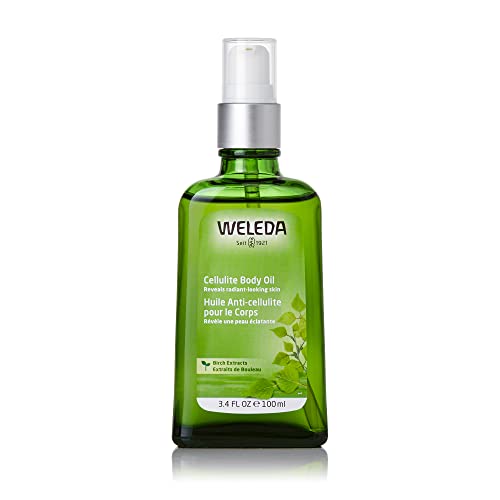
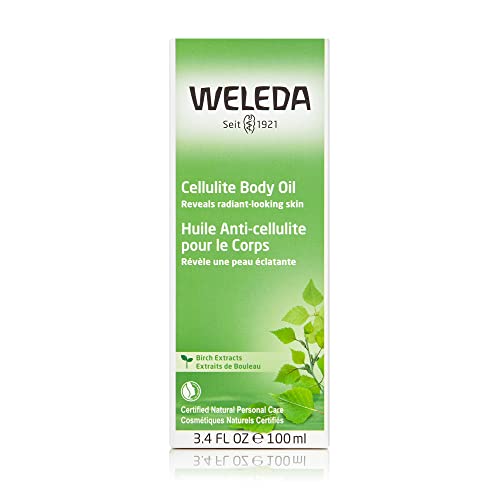
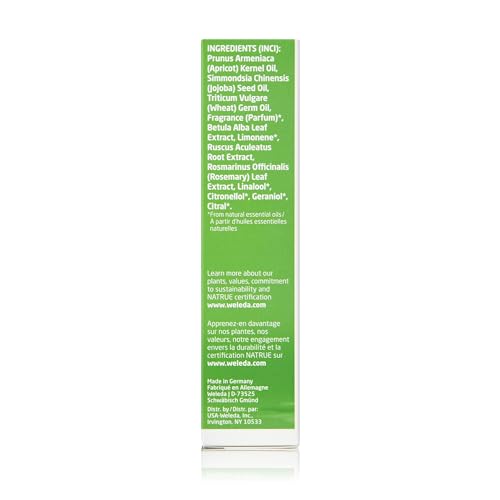
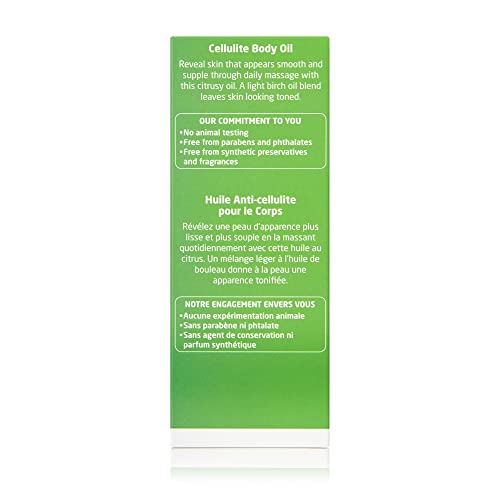
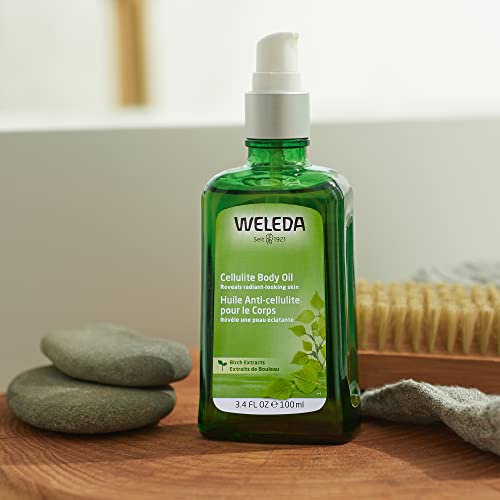
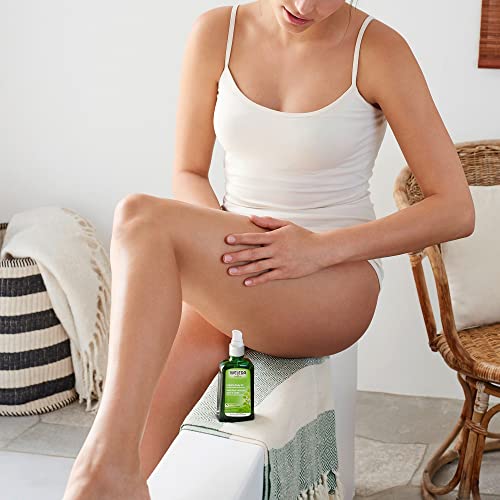
Weleda Body Oil - Smooths Skin, Plant-Rich with Birch & Rosemary, Quick Absorption - 3.4oz


Citral
High RiskCitral is a naturally occurring scent ingredient primarily used for its lemon-like fragrance in various products, including perfumes, cosmetics, and food. It is derived from essential oils such as lemon myrtle and lemongrass.
Sustai Insights
Citral offers functional benefits as a fragrance component, enhancing product appeal. However, it is associated with a high risk of allergy and irritation, particularly affecting the skin, eyes, and respiratory system. While its carcinogenicity and reproductive toxicity concerns are low, citral's environmental impact as a potential irritant raises caution. Regulatory bodies note usage restrictions due to its allergenic potential, leading to an overall high-risk assessment. Safe practices include patch testing for allergies, and alternatives such as synthetic fragrances may offer lower irritation risks.
Citronellol
High RiskCitronellol is a naturally occurring scent ingredient commonly found in various essential oils. It is primarily used for its aromatic properties in perfumes, cosmetics, and household products, contributing to fragrance profiles.
Sustai Insights
Citronellol serves as a fragrance component, enhancing product appeal. However, it has a high allergenic potential, posing risks of skin irritation and sensitization. Environmental concerns include contamination risks. Regulatory bodies have restrictions on its use, emphasizing caution. Overall, citronellol presents a high risk regarding health and safety, warranting careful consideration in product formulations.
Geraniol
High RiskGeraniol is a naturally occurring scent ingredient commonly found in essential oils from plants such as geraniums and lemongrass. It is primarily used for its pleasant floral aroma in perfumes, cosmetics, and household products.
Sustai Insights
Geraniol serves as a fragrance component and offers a natural option for scenting products. However, it has a high allergenic potential and may cause skin irritation in sensitive individuals. While it is considered low risk for carcinogenicity and reproductive toxicity, regulatory bodies have placed restrictions on its use due to allergenic concerns. Overall, the assessment reflects a high-risk level, particularly for those prone to allergies, highlighting the need for caution in its application.
Linalool
High RiskLinalool is a terpene commonly found in various plants, particularly in lavender and mint. It is primarily used in products for its fragrance and potential antimicrobial properties. Linalool is also utilized in formulations for its ability to enhance the sensory experience of personal care and household products.
Sustai Insights
Linalool offers functional benefits as a naturally occurring fragrance component and may exhibit antimicrobial properties. However, it presents high allergenic potential, with concerns about skin irritation and sensitization. Environmental risks include contamination issues, though it is not classified as a persistent pollutant. Regulatory bodies have noted the need for careful handling due to its allergenic nature. Overall, despite some beneficial attributes, the ingredient carries a high risk profile, warranting cautious use and consideration of safer alternatives.
Fragrance
High RiskFragrance refers to a mixture of aromatic compounds used in products to provide scent. It is commonly listed as 'fragrance' or 'parfum' on product labels and can serve various functions, including enhancing user experience and masking undesirable odors.
Sustai Insights
Fragrance offers functional benefits by improving product appeal; however, it poses significant health risks, notably a high likelihood of causing allergies and allergic contact dermatitis. Environmental risks include potential pollution and endocrine disruption, though its overall carcinogenicity is low. Regulatory bodies have noted concerns regarding its use, leading to a high-risk classification. Safe usage practices should be observed, and alternatives such as natural essential oils are recommended for those sensitive to synthetic fragrances.
Rosmarinus Officinalis (Rosemary) Leaf Extract
Medium RiskRosemary leaf extract is produced from the leaves of the Rosmarinus officinalis plant. It is commonly used in cosmetic formulations for its potential antioxidant properties and fragrance. The extract may also contribute to the preservation of products due to its antimicrobial characteristics.
Sustai Insights
Rosemary leaf extract offers functional benefits such as antioxidant and antimicrobial properties, which can enhance product stability and shelf-life. It is generally considered low risk for carcinogenicity and reproductive toxicity, but it carries a moderate potential for allergic reactions. Environmentally, it poses low risk with no significant pollutant or bioaccumulation concerns. Regulatory bodies have not placed significant restrictions on its use, although some verified products cannot contain certain concentrations. Overall, the ingredient's risk level is medium, necessitating careful usage practices to mitigate allergic responses.
Limonene
Medium RiskLimonene is a scent ingredient and solvent naturally found in citrus fruits, commonly used in personal care and cleaning products for its fragrant properties. It serves as a flavoring agent and enhances the overall sensory experience of products.
Sustai Insights
Limonene offers functional benefits such as acting as a solvent and fragrance enhancer. However, it carries a high allergenic potential, which can trigger skin or respiratory sensitivities in some individuals. Environmental concerns include moderate persistence and bioaccumulation, along with potential ecotoxicity. Regulatory restrictions necessitate verification in products containing this ingredient. Overall, the risk level is assessed as medium, emphasizing the importance of cautious use, particularly for sensitive populations. Safer alternatives may be considered to mitigate these risks.
Prunus Armeniaca (Apricot) Oil
Low RiskPrunus armeniaca (apricot) oil is a cosmetic ingredient derived from the seeds of the apricot fruit. It functions primarily as a moisturizer and emollient in cosmetic formulations, providing hydration to the skin while enhancing the texture and feel of products.
Sustai Insights
Prunus armeniaca oil offers functional benefits as a moisturizer and emollient, supporting skin hydration and texture. It is sustainably sourced with low environmental impact. Health risks are minimal, as it has low concerns for carcinogenicity, allergies, and reproductive toxicity. Regulatory bodies do not impose restrictions on its use. Overall, the ingredient is assessed to have low risk, making it a safe choice in cosmetic formulations. Alternatives include other plant oils that offer similar moisturizing properties.
Triticum Vulgare (Wheat) Germ Oil
Low RiskWheat germ oil is extracted from the germ of the wheat kernel and is known for its rich nutrient profile, including vitamins E and B, essential fatty acids, and antioxidants. It is primarily used in cosmetic formulations for its moisturizing and nourishing properties.
Sustai Insights
Wheat germ oil offers functional benefits such as skin hydration and antioxidant protection due to its high vitamin E content. It is derived from a renewable source and is biodegradable. Health risks are considered low, with minimal concerns regarding carcinogenicity, allergies, or reproductive toxicity. Environmentally, it poses low risks, with no significant pollution or bioaccumulation noted. Regulatory advisories indicate no major restrictions. Overall, it presents a low risk profile, making it a suitable ingredient in cosmetic products. Safe usage practices include avoiding use by individuals with known wheat allergies.
Ruscus Aculeatus (Box Holly) Root Extract
Low RiskRuscus aculeatus (box holly) root extract is derived from the roots of the box holly plant. It is commonly used in cosmetic formulations for its potential soothing and anti-inflammatory properties. The extract may also play a role in enhancing skin elasticity and tonicity.
Sustai Insights
Ruscus aculeatus root extract offers functional benefits such as anti-inflammatory effects and skin toning. It is not associated with significant health risks or environmental hazards, categorized as low for concerns like carcinogenicity and allergies. Regulatory bodies have not imposed restrictions on its use, leading to an overall low-risk assessment. Safe practices for use are recommended, and alternatives may include other botanical extracts with similar properties.
Betula Alba (Birch) Leaf Extract
Low RiskBetula alba (birch) leaf extract is derived from the leaves of the birch tree and is commonly used in cosmetic formulations for its potential soothing and anti-inflammatory properties.
Sustai Insights
Betula alba leaf extract offers functional benefits such as potential skin soothing and anti-inflammatory effects. It is considered to have low health risk, with no significant concerns regarding carcinogenicity, allergies, or reproductive toxicity. Environmentally, it is not known to be a pollutant or bioaccumulative. Regulatory assessments indicate no current restrictions. Overall, the ingredient is assessed as low risk, making it a suitable choice for cosmetic applications. Users should follow safe usage practices, and alternatives may include other botanical extracts with similar properties.
Simmondsia Chinensis (Jojoba) Seed Oil
Low RiskSimmondsia chinensis (jojoba) seed oil is extracted from the seeds of the jojoba plant. It is commonly used in cosmetics for its moisturizing properties and ability to mimic human sebum, making it beneficial for skin and hair care formulations.
Sustai Insights
Jojoba seed oil offers functional benefits such as effective moisturization and emollience, contributing to skin hydration and smoothness. It is sustainably sourced and biodegradable. Health risks are low, with minimal concerns regarding carcinogenicity, allergies, and reproductive toxicity. Environmental risks are also low, as it does not significantly contribute to pollution or bioaccumulation. Currently, there are no regulatory restrictions on its use. Overall, the risk level is low, and it is considered a safe ingredient with no significant adverse effects.
Citral
High RiskCitral is a naturally occurring scent ingredient primarily used for its lemon-like fragrance in various products, including perfumes, cosmetics, and food. It is derived from essential oils such as lemon myrtle and lemongrass.
Sustai Insights
Citral offers functional benefits as a fragrance component, enhancing product appeal. However, it is associated with a high risk of allergy and irritation, particularly affecting the skin, eyes, and respiratory system. While its carcinogenicity and reproductive toxicity concerns are low, citral's environmental impact as a potential irritant raises caution. Regulatory bodies note usage restrictions due to its allergenic potential, leading to an overall high-risk assessment. Safe practices include patch testing for allergies, and alternatives such as synthetic fragrances may offer lower irritation risks.
Citronellol
High RiskCitronellol is a naturally occurring scent ingredient commonly found in various essential oils. It is primarily used for its aromatic properties in perfumes, cosmetics, and household products, contributing to fragrance profiles.
Sustai Insights
Citronellol serves as a fragrance component, enhancing product appeal. However, it has a high allergenic potential, posing risks of skin irritation and sensitization. Environmental concerns include contamination risks. Regulatory bodies have restrictions on its use, emphasizing caution. Overall, citronellol presents a high risk regarding health and safety, warranting careful consideration in product formulations.
Prunus Armeniaca (Apricot) Oil
Low RiskPrunus armeniaca (apricot) oil is a cosmetic ingredient derived from the seeds of the apricot fruit. It functions primarily as a moisturizer and emollient in cosmetic formulations, providing hydration to the skin while enhancing the texture and feel of products.
Sustai Insights
Prunus armeniaca oil offers functional benefits as a moisturizer and emollient, supporting skin hydration and texture. It is sustainably sourced with low environmental impact. Health risks are minimal, as it has low concerns for carcinogenicity, allergies, and reproductive toxicity. Regulatory bodies do not impose restrictions on its use. Overall, the ingredient is assessed to have low risk, making it a safe choice in cosmetic formulations. Alternatives include other plant oils that offer similar moisturizing properties.
Rosmarinus Officinalis (Rosemary) Leaf Extract
Medium RiskRosemary leaf extract is produced from the leaves of the Rosmarinus officinalis plant. It is commonly used in cosmetic formulations for its potential antioxidant properties and fragrance. The extract may also contribute to the preservation of products due to its antimicrobial characteristics.
Sustai Insights
Rosemary leaf extract offers functional benefits such as antioxidant and antimicrobial properties, which can enhance product stability and shelf-life. It is generally considered low risk for carcinogenicity and reproductive toxicity, but it carries a moderate potential for allergic reactions. Environmentally, it poses low risk with no significant pollutant or bioaccumulation concerns. Regulatory bodies have not placed significant restrictions on its use, although some verified products cannot contain certain concentrations. Overall, the ingredient's risk level is medium, necessitating careful usage practices to mitigate allergic responses.
Triticum Vulgare (Wheat) Germ Oil
Low RiskWheat germ oil is extracted from the germ of the wheat kernel and is known for its rich nutrient profile, including vitamins E and B, essential fatty acids, and antioxidants. It is primarily used in cosmetic formulations for its moisturizing and nourishing properties.
Sustai Insights
Wheat germ oil offers functional benefits such as skin hydration and antioxidant protection due to its high vitamin E content. It is derived from a renewable source and is biodegradable. Health risks are considered low, with minimal concerns regarding carcinogenicity, allergies, or reproductive toxicity. Environmentally, it poses low risks, with no significant pollution or bioaccumulation noted. Regulatory advisories indicate no major restrictions. Overall, it presents a low risk profile, making it a suitable ingredient in cosmetic products. Safe usage practices include avoiding use by individuals with known wheat allergies.
Geraniol
High RiskGeraniol is a naturally occurring scent ingredient commonly found in essential oils from plants such as geraniums and lemongrass. It is primarily used for its pleasant floral aroma in perfumes, cosmetics, and household products.
Sustai Insights
Geraniol serves as a fragrance component and offers a natural option for scenting products. However, it has a high allergenic potential and may cause skin irritation in sensitive individuals. While it is considered low risk for carcinogenicity and reproductive toxicity, regulatory bodies have placed restrictions on its use due to allergenic concerns. Overall, the assessment reflects a high-risk level, particularly for those prone to allergies, highlighting the need for caution in its application.
Ruscus Aculeatus (Box Holly) Root Extract
Low RiskRuscus aculeatus (box holly) root extract is derived from the roots of the box holly plant. It is commonly used in cosmetic formulations for its potential soothing and anti-inflammatory properties. The extract may also play a role in enhancing skin elasticity and tonicity.
Sustai Insights
Ruscus aculeatus root extract offers functional benefits such as anti-inflammatory effects and skin toning. It is not associated with significant health risks or environmental hazards, categorized as low for concerns like carcinogenicity and allergies. Regulatory bodies have not imposed restrictions on its use, leading to an overall low-risk assessment. Safe practices for use are recommended, and alternatives may include other botanical extracts with similar properties.
Betula Alba (Birch) Leaf Extract
Low RiskBetula alba (birch) leaf extract is derived from the leaves of the birch tree and is commonly used in cosmetic formulations for its potential soothing and anti-inflammatory properties.
Sustai Insights
Betula alba leaf extract offers functional benefits such as potential skin soothing and anti-inflammatory effects. It is considered to have low health risk, with no significant concerns regarding carcinogenicity, allergies, or reproductive toxicity. Environmentally, it is not known to be a pollutant or bioaccumulative. Regulatory assessments indicate no current restrictions. Overall, the ingredient is assessed as low risk, making it a suitable choice for cosmetic applications. Users should follow safe usage practices, and alternatives may include other botanical extracts with similar properties.
Limonene
Medium RiskLimonene is a scent ingredient and solvent naturally found in citrus fruits, commonly used in personal care and cleaning products for its fragrant properties. It serves as a flavoring agent and enhances the overall sensory experience of products.
Sustai Insights
Limonene offers functional benefits such as acting as a solvent and fragrance enhancer. However, it carries a high allergenic potential, which can trigger skin or respiratory sensitivities in some individuals. Environmental concerns include moderate persistence and bioaccumulation, along with potential ecotoxicity. Regulatory restrictions necessitate verification in products containing this ingredient. Overall, the risk level is assessed as medium, emphasizing the importance of cautious use, particularly for sensitive populations. Safer alternatives may be considered to mitigate these risks.
Linalool
High RiskLinalool is a terpene commonly found in various plants, particularly in lavender and mint. It is primarily used in products for its fragrance and potential antimicrobial properties. Linalool is also utilized in formulations for its ability to enhance the sensory experience of personal care and household products.
Sustai Insights
Linalool offers functional benefits as a naturally occurring fragrance component and may exhibit antimicrobial properties. However, it presents high allergenic potential, with concerns about skin irritation and sensitization. Environmental risks include contamination issues, though it is not classified as a persistent pollutant. Regulatory bodies have noted the need for careful handling due to its allergenic nature. Overall, despite some beneficial attributes, the ingredient carries a high risk profile, warranting cautious use and consideration of safer alternatives.
Fragrance
High RiskFragrance refers to a mixture of aromatic compounds used in products to provide scent. It is commonly listed as 'fragrance' or 'parfum' on product labels and can serve various functions, including enhancing user experience and masking undesirable odors.
Sustai Insights
Fragrance offers functional benefits by improving product appeal; however, it poses significant health risks, notably a high likelihood of causing allergies and allergic contact dermatitis. Environmental risks include potential pollution and endocrine disruption, though its overall carcinogenicity is low. Regulatory bodies have noted concerns regarding its use, leading to a high-risk classification. Safe usage practices should be observed, and alternatives such as natural essential oils are recommended for those sensitive to synthetic fragrances.
Simmondsia Chinensis (Jojoba) Seed Oil
Low RiskSimmondsia chinensis (jojoba) seed oil is extracted from the seeds of the jojoba plant. It is commonly used in cosmetics for its moisturizing properties and ability to mimic human sebum, making it beneficial for skin and hair care formulations.
Sustai Insights
Jojoba seed oil offers functional benefits such as effective moisturization and emollience, contributing to skin hydration and smoothness. It is sustainably sourced and biodegradable. Health risks are low, with minimal concerns regarding carcinogenicity, allergies, and reproductive toxicity. Environmental risks are also low, as it does not significantly contribute to pollution or bioaccumulation. Currently, there are no regulatory restrictions on its use. Overall, the risk level is low, and it is considered a safe ingredient with no significant adverse effects.
Experience the revitalizing benefits of Weleda Birch Cellulite Body Oil, a plant-rich formula designed to tone and smooth your skin. Infused with invigorating birch, rosemary, and jojoba, this body oil is perfect for those seeking natural beauty solutions.
- Tone and Smooth Skin: Harness the power of birch oil to reduce the appearance of cellulite, revealing skin that feels supple and looks toned.
- Quick Absorption: This non-greasy formula absorbs quickly, making it ideal for post-shower application.
- Refreshing Aroma: Enjoy the light, refreshing scent of grapefruit and cypress oils, perfect for any time of day.
- Natural Ingredients: Crafted with extracts from young birch leaves and vitamin-rich oils, this product is certified natural by NATRUE, ensuring quality and care.
- Ethical Commitment: Weleda stands by its promise—free from synthetic additives and cruelty-free, supporting a healthier planet and community.
Integrate this luxurious oil into your daily routine for lasting benefits and a delightful sensory experience.
Subscribe & Save with Sustai
- Best Price Guarantee: Always enjoy the lowest prices on sustainable home essentials.
- No Surprises: We’ll notify you before shipping. No hidden fees, ever.
- You’re in Charge: Change, pause, or cancel your subscription anytime with ease.
- Eco-Friendly Deliveries: Our grouped shipments mean less packaging and lower emissions.
Join us on a sustainable journey. Special offers for a limited time! Prices and promotions may change.
Recommended Products
Experience the revitalizing benefits of Weleda Birch Cellulite Body Oil, a plant-rich formula designed to tone and smooth your skin. Infused with invigorating birch, rosemary, and jojoba, this body oil is perfect for those seeking natural beauty solutions.
- Tone and Smooth Skin: Harness the power of birch oil to reduce the appearance of cellulite, revealing skin that feels supple and looks toned.
- Quick Absorption: This non-greasy formula absorbs quickly, making it ideal for post-shower application.
- Refreshing Aroma: Enjoy the light, refreshing scent of grapefruit and cypress oils, perfect for any time of day.
- Natural Ingredients: Crafted with extracts from young birch leaves and vitamin-rich oils, this product is certified natural by NATRUE, ensuring quality and care.
- Ethical Commitment: Weleda stands by its promise—free from synthetic additives and cruelty-free, supporting a healthier planet and community.
Integrate this luxurious oil into your daily routine for lasting benefits and a delightful sensory experience.

You can have at most 2 Sustainable Steals products in your cart
Customer Reviews
Customers’ View
Customers appreciate the effectiveness and natural formulation of Weleda's Body Oil, often highlighting its pleasant scent and skin-softening qualities. Many users note that it absorbs quickly without leaving an oily residue, making it suitable for post-shower application. Common praises include its ability to moisturize effectively, with one customer mentioning, 'It really absorbs well and leaves my skin feeling soft and silky.' While some customers express mixed feelings about its value for money, many feel the investment is justified due to the high-quality ingredients and the absence of harmful chemicals. Overall, customers find this product aligns well with their eco-conscious and health-focused lifestyle.
AI-generated from the text of customer reviewsThis product is rated 4.9 of 5.0 stars.
It has received 7 reviews.





